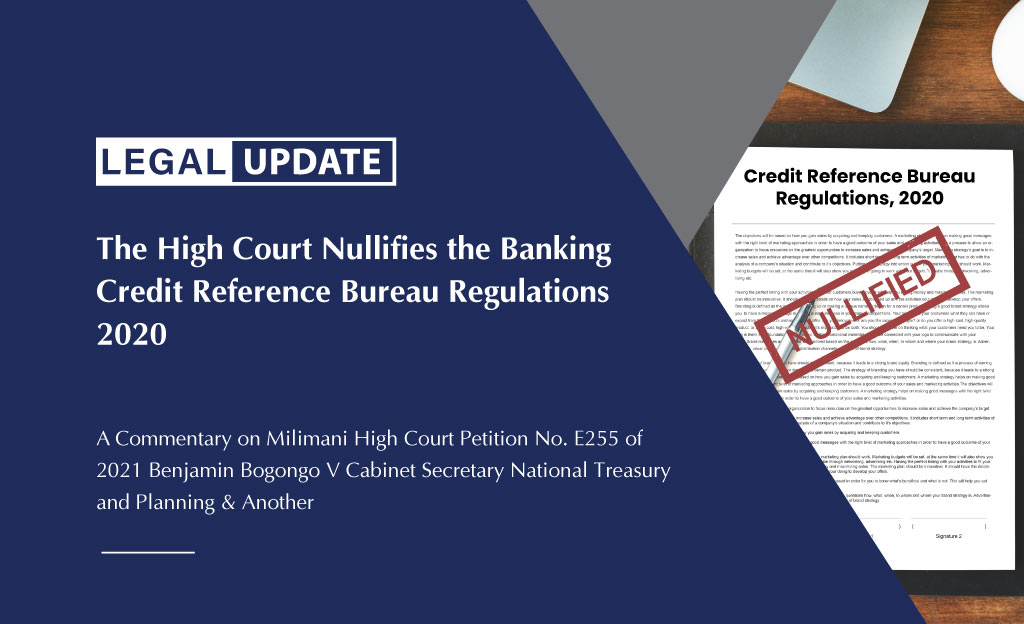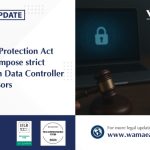 Loading...
Loading...
- BACKGROUND
- On 14th April 2020, the Central Bank of Kenya [CBK] issued a press release announcing the publication of the Credit Reference Bureau Regulations, 2020 [hereinafter the ‘the 2020 Regulations’] vide Gazette Notice No. 55 of 8th April 2020. These regulations were pegged to replace the Credit Reference Bureau Regulations, 2013 [hereinafter the ‘the 2013 Regulations’]. According, to CBK they were exercising their mandate as per Section 31(3) of the Bank Act Cap. 488 Laws of Kenya.
- According to CBK, the CRB Regulations 2020 were developed through a consultative process that started 2018, and was intended to strengthen Kenya’s Credit Information Sharing System (CIS) that had been operation since 2010. Further information on CIS is provided for in the National Treasury and Planning, National Policy Support paper of September 2019.
- As per CBK’s presser, the key reforms targeted by the Regulations included;
- A minimum threshold of Kshs. 1,000 had been set for negative credit information, this meant that any amount below Kshs. 1,000 would not be submitted to CRBs, and any borrowers whom had non-performing loans of below Kshs. 1,000 whom were ‘blacklisted’ were to be delisted.
- First-time CRB Clearance certificate will be provided by the CRBs at no charge. This was intended to favour graduates seeking employment.
- SACCO Societies regulated by the Sacco Societies Regulatory Authority (SASRA) were authorised subscribers of credit data to CRBs. Therefore, SACCOs could submit borrower information to CRBs, and have access to the same reports.
- ADDITIONAL AMENDMENTS INTRODUCED BY THE CRB REGULATIONS 2020
- We have looked at length, but not exhaustively, the additional changes made vide the 2020 Regulations which in are noted as follows:
-
- In respect of refusal to issue a licence by CBK, the regulations provided for an appeal process to the Cabinet Secretary. In the 2020 Regulations, a further ground had been provided being ‘based on a review of the record, the Central Bank abused its discretion.’ This regulation did not exist in the 2013 Regulations.
- Additionally, the 2020 Regulations provided that a party that was dissatisfied by the decision of the CS had the right to appeal to the High Court which determination was final, however, as per the 2013 Regulations the decision of the CS was binding.
- In respect of the operations of Bureaus, a more detailed list of activities was provided for under Regulations 2020, which included activities pursuant to the Microfinance Act, 2006 and the Sacco Societies Act, 2008.
- The 2020 Regulations recognised the engagement of bureaus with agents, however, the same went as far as to recognise agents under the Microfinance Act, 2006 and the Sacco Societies Act, 2008..
- Amongst customer information that could be shared, the 2020 Regulations, allowed for sharing of the shareholders, directors, partners, or officials of a incorporate entities. We believe that this is in line with sharing of beneficial owner information. The 2013 Regulations were silent on this information.
-
- Through the 2020 Regulations, CBK is to approve the format in which customer information would be furnished.
- CBK was to impose the liability for incomplete and inaccurate information, and was to impose the penalty to any institution or third party.
- The Regulations also allowed the CS, with recommendation of CBK, to suspend some aspect of exchange negative information for such period and for such reasons as the CS may specify.
-
- The Regulations provided for the right to indemnity against another party. We note that the 2013 Regulations are silent on the same, as this is a plausible defence to a suit made in respect of enforcement of rights under the CRB Regulations.
- The 2020 Regulations provided for the fees payable by third party credit information provided, the 2013 Regulations did not provide for such fees.
- The 2020 Regulations placed a duty on bureaus to undertake detailed due diligence and suitability assessment of third-party credit information providers. And could not rely on third party information that was based on estimates and CBK would approve the industry code.
- The 2020 Regulations provided for a rider in respect of notifying customers of listing, in respect of a positive listing, the credit information provider need not provide to the customer the 30 days notification prior to submitting the information.
- The Regulations affirmed the right of confidentiality, however, added an exception that incorporates the provisions of the Microfinance Act, 2006 and the Sacco Societies Act, 2008.
- The Regulations provided that Bureaus would maintain and establish a dispute resolution unit to handle queries or complaints and a dedicated telephone line.
- The 2020 Regulations provided that Bureaus would maintain a data base that can searched using either a natural person’s ID, Passport, PIN or other identification number, and in the case of incorporated/unincorporated entities their PINs and that of their directors.
-
- The 2020 Regulations limited Bureaus from increasing fees charged without CBK approval, however, the 2013 Regulations are silent on the increase of fees approval. In the 2013 Regulations, the terms in respect of fees are not provided in mandatory terms when it comes to CBK approval, which included providing reasons for the increase when making an application to CBK. Under the 2020 Regulations the increase of fees was so strict that CBK had the lee way to even reduce the fees downward.
- In the Regulations Bureaus were to expunge information after the expiry of the periods specified under the regulations, however, the 2013 regulations do not provide for the expunging of information.
- The Regulations also introduced right to access of information to institutions or third-party credit providers to the information submitted to bureaus.
- The Regulations provided that the use of credit scores shall not be used solely for the denial of customers of credit facilities but as a factor to inform the decision making.
-
- The Regulations provided for the sharing of cross boarder credit information which was previously not envisaged in the 2013 Regulations. The same is applicable only where there is a reciprocating arrangement between the persons sharing the cross-border information. CBK was to publish the list of the reciprocal arrangements.
- To ensure that proper corporate governance of Bureaus, the 2020 Regulations went as far elaborately provide regulations on for the functions of the board, meetings of the board, voting of the board, and capital.
- The 2020 Regulations place mandatory duty on bureaus to provide to CBK by 31st March of each year their audited financial statements for the previous year.
-
- The 2020 Regulations placed a responsibility to third party credit information providers, this responsibility was previously limited to Institutions.
- The 2020 Regulations provided for the framework for the bureaus, institutions, and third-party credit information providers to jointly develop a central hub or industry tool for the submission of credit information.
- There was also a duty placed on Bureaus to publish a list of all other third-party providers that they are engaged with, both at their premises and on their website.
- A further duty was placed on Bureaus and institutions to conduct public education on credit information sharing, the benefits, risks to mitigate, availability of services, how to access the services and any other useful beneficial material to the public.
- THE PETITION.
- The Petitioners filed the Constitutional petition dated 5th July 2021 seeking to declare the Credit Reference Bureau Regulations 2020 unconstitutional, null and void. The crux of the Petitioner’s argument was that the process of enactment of the regulations did not meet the constitutional threshold as provided under Articles 1,10, 26, 27, 28, 40 and 43 of the Constitution. Additionally, the Petitions contention was that the Regulations did not meet the constitutional requirements on public participation.
- The Petitioner also argued that the regulations were void for failure to comply with Section 11 of the Statutory Instruments Act, which requires all statutory instruments to be tabled before the relevant house of parliament within 7 days from the date of its publication.
- THE RATIO DECIDENDI
- The Judge upon hearing the parties, proceeded to deliberate on 5 issues, whether the Petition meets the threshold of a constitutional petition; Whether the impugned regulations 28(4) and 32(4) were subjected to public participation; Whether the 1st Respondent contravened the provisions of Section 11 of the Statutory Instruments Act, 2013; Whether regulation 28(4) of the CRB Regulations 2020 violates Articles 27 and 40 of the Constitution; and Whether an order should issue for compensation for damages and loss occasioned to service providers if any.
- The court’s analysis noted that the petition had meet the legal threshold of a constitutional petition together with the noting that CBK engaged stakeholders extensively in the process of promulgation of the Regulations.
- However, in addressing the issue of whether the Regulations contravened Section 11 of the Statutory Instruments Act, the Learned judge went on to note that the Regulations were published on 8th April 2020, the Cabinet Secretary for National Treasury and Economic Planning was required to have the regulations laid before Parliament by 14th April 2020. But, the regulations were received by the Clerk of the National Assembly on 5th May 2020, which was well beyond the 7-day period provided under Section 11 of the Act.
- Section 11 of the Act, provides inter-alia:
“11. Laying of statutory instruments before Parliament
(1)Every Cabinet Secretary responsible for a regulation-making authority shall within seven (7) sitting days after the publication of a statutory instrument, ensure that a copy of the statutory instrument is transmitted to the responsible Clerk for tabling before the relevant House of Parliament.
(2)….
- Accordingly, there was a failure to comply with the Act, as demonstrated from the mandatory timelines provided in the Act. The learned Judge relied on the cases of Republic v Cabinet Secretary for Transport & Infrastructure Principle Secretary & 5 Others ex-parte Kenya Country Bus Owners Association & 8 Others [2014] eKLR, and George Ndemo Sagini vs Attorney General & 3 others [2017] eKLR, where the Courts held that failure to table a Statutory Instrument within 7 days of its publication renders the instrument without effect. According to the Court, since Section 11(4) of the Statutory Instruments Act is couched in mandatory terms, failure to table the instrument renders the instrument in question null and void.
- The learned judge then proceeds to declare that the Regulations were null and void for non-compliance with the timelines stipulated in Section 11(1) of the Act. In respect of the award of damages it the court noted that there was no submission by service providers thus the same was not awarded.
- IMPLICATIONS OF THE JUDGMENT
- As a result of the Judgment, the entire Banking (Credit Reference Bureau Regulations) 2020 are void by operation of the law and has no legal effect. Therefore, the Regulations are inapplicable and have no legal force. In the case of Independent Electoral and Boundaries Commission & 4 others v Ndii & 312 others; Ojwang & 4 others (Amicus Curiae) (Petition E291 of 2021 & Civil Appeal E292, E293 & E294 of 2021 (Consolidated)) [2021] KECA 363 (KLR), it was held that where a statutory provision is declared invalid, the default position was that the declaration of unconstitutionality related back to when the unconstitutional provisions were enacted, with the result, that the previous instrument is restored. Therefore, the applicable regulations now are the Credit Reference Bureau Regulations 2013, until such a time that the cabinet secretary shall follow the correct procedure.
- IMPACT ON THE INDUSTRY.
- We note that amongst key parties in this sector that shall be affected by the decisions are financial institutions, i.e. Banks, deposit and non-deposit taking Microfinances, digital lenders, and SACCOs. With the effect of voiding the regulations the industry reverts to the 2013 Regulations, which had left out deposit and non-deposit taking Microfinances, and SACCOs.
- In respect of digital lenders, it is noted a larger amount of people may be blacklisted for debts below Kshs. 1,000, which results in abuse off credit referencing by Digital Lenders. Additionally, the 2020 Regulations had withdrawn the approvals granted to unregulated digital (mobile-based) and credit-only lenders as third-party credit information providers to CRBs. The withdrawal was in response to numerous public complaints about misuse of the CIS by the unregulated digital and credit-only lenders, particularly their poor responsiveness to customer complaints. Thus, unregulated digital and credit only lenders will no longer submit credit information on their borrowers to CRBs
- Further, the industry association, the Credit Information Sharing Association of Kenya (CIS Kenya), will also be affected. CIS Kenya was set up to institutionalise the National Credit Information Sharing (CIS) Forum. The association, which was formulated in 2012, and brings together both bank and non-bank credit providers. As per their website CIS Kenya had a total membership of about 32 institutions, which include Credit Reference Bureaus, Digital Lenders, SACCOs, State Lenders, State Corporations, Trade Institutions.
- Suffice to note that the extensive measures in regulation of the industry were both beneficial to the customers as well as to the institutions, and by the voiding of the Regulations, the industry has lost substantial gains made. Nevertheless, should CBK proceed to reintroduce the regulations, it is prudent that they also ensure compliance with other Acts, such as the Data Protection Act, 2019, (DPA) in respect of transfer of Data out of jurisdiction. There will be need to align the regulations with the DPA, as pertains sharing of cross boarder credit information which was previously not envisaged in the 2013 Regulations and/or ensuring that presently any reciprocal agreements and Bureaus align and comply with the DPA.
This article is provided free of charge for information purposes only; it does not constitute legal advice and should be relied on as such. No responsibility for the accuracy and/or correctness of the information and commentary as set in the article should be held without seeking specific legal advice on the subject matter. If you have any query regarding the same, please do not hesitate to contact Litigation at Litigation@wamaeallen.com.
About the author
Kennedy has gained his experience in the arena of Dispute Resolution by acting for and advising both local and international clients in a myriad of disputes and preparation of various agreements. Over his years of practice, Kennedy has engaged in complex and high value litigation before the Court of Appeal, High Courts, as well as Quasi-Judicial Tribunals such as the Public Procurement Administrative Review Board, Tax Appeals Tribunal and international dispute resolution bodies.
Frankline M. Otieno is a dispute resolution associate, recommended professional and committed to offering sustainable client-centred solutions to legal issues.
Frankline is astute in commercial litigation, securities law, banking law, intellectual property litigation, public procurement, land law litigation, Judicial Review and Administrative law litigation, sports law, tax litigation, administrative law, consumer protection law, competition law and constitutional litigation.
-
Frankline Otienohttps://wamaeallen.com/author/frankline-michael-otieno/
-
Frankline Otienohttps://wamaeallen.com/author/frankline-michael-otieno/
-
Frankline Otienohttps://wamaeallen.com/author/frankline-michael-otieno/
-
Frankline Otienohttps://wamaeallen.com/author/frankline-michael-otieno/












